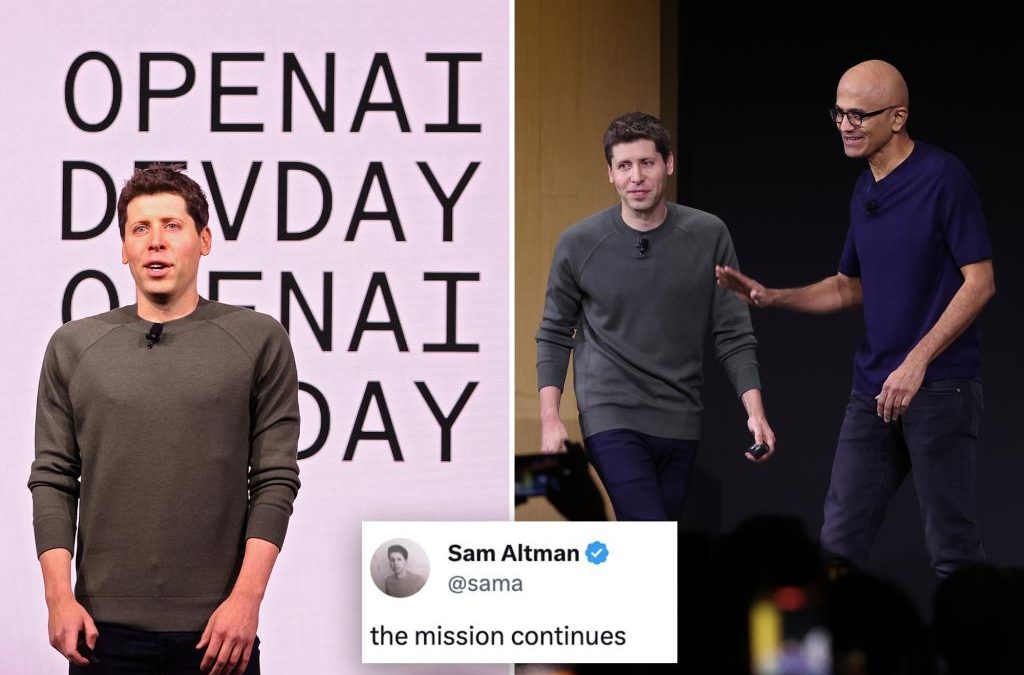Microsoft’s CEO announced in the early hours of Monday morning that Sam Altman — who was ousted from artificial-intelligence startup OpenAI in a surprise announcement late Friday — is joining Microsoft.
“We’re extremely excited to share the news that Sam Altman and Greg Brockman, together with colleagues, will be joining Microsoft to lead a new advanced AI research team,” Microsoft chief Satya Nadella shared.
Brockman, a close ally of Altman, said he would step down from the board, but later quit his role as OpenAI’s president entirely in protest of Altman’s ouster.
It’s unclear what other former OpenAI staffers will be jumping ship to Microsoft, although the numbers could be in the hundreds as OpenAI faces a possible employee revolt, according to reports.
Altman responded to Nadella with: “the mission continues.”
Microsoft shares rose more than 2% in pre-market trading hours on Monday following the news.
Nadella revealed in a subsequent X post that Atlman will be serving as the CEO of a new group, “setting a new pace for innovation.”
“We’ve learned a lot over the years about how to give founders and innovators space to build independent identities and cultures within Microsoft, including GitHub, Mojang Studios and LinkedIn, and I’m looking forward to having you do the same,” Nadella added.
The Microsoft CEO seemingly remained positive about the upheaval at OpenAI, where the board appeared to quietly find a fellow tech whiz to take Altman’s spot: Emmet Shear, the former CEO of Twitch, a live-streaming service owned by Amazon.
Shear, 40, who ended his 16-year tenure at Twitch in March, was named the interim CEO of OpenAI.
“I took this job because I believe that OpenAI is one of the most important companies currently in existence,” Shear posted to X on Monday morning.
After the niceties, Shear wrote: “It’s clear that the process and communications around Sam’s removal has been handled very badly, which has seriously damaged our trust,” adding that he has plans to “fire”hire an independent investigator to dig into the entire process leading up to this point and generate a full report.”
Shear’s post concluded a whirlwind of a weekend that began when OpenAI announced the shocking executive shakeup on Friday. The board vaguely cited Altman as “not consistently candid in his communications with the board.”
The leading AI firm did not elaborate on Altman’s missteps that led to his resignation.
Nadella assured that Microsoft “remains committed to our partnership with OpenAI and have confidence in our product roadmap, our ability to continue to innovate with everything we announced at Microsoft Ignite and in continuing to support our customers and partners.”
As OpenAI CEO, Altman secured a $10 billion “multiyear” agreement with Microsoft earlier this year, expanding upon a partnership that began in 2019 with just $1 billion from the Big Tech firm.
To date, Microsoft has pumped $13 billion into the firm for a 49% stake in the company amid intense competition with rivals such as Google. OpenAI has reportedly been offering packages worth as much as $10 million to lure top AI talent away from Google, which is rumored to be in talks to invest hundreds of millions of dollars in Character.AI, according to Reuters — an AI bot startup developed by two former Google employees.
Altman just last week hinted that OpenAI may be getting more financial backing from its top investor as he looks to build “superintelligent” tech tools that would be as smart as humans.
Microsoft is said to have been blindsided by the news, with tech insider Kara Swisher reporting that the company and other key partners “found out minutes before the release went out.”
The Post has sought comment from Microsoft and OpenAI.
Atlman, who co-founded OpenAI as a nonprofit in 2015 alongside Elon Musk and former PayPal CEO Peter Thiel, has become the face for the AI movement.
However, as AI has gained mainstream popularity, the firms behind the tech have faced mounting regulatory scrutiny on Capitol Hill, where lawmakers on both sides of the aisle have called for the implementation of laws governing the use of AI.
In May, Altman expressed his support for federal AI regulation during an appearance on Capitol Hill, where he testified that rules were needed to prevent “significant harm to the world.”
Altman also raised eyebrows earlier this year by signing a statement that declared AI as a potential existential risk on par with nuclear weapons and pandemics if not properly guided.
Source




